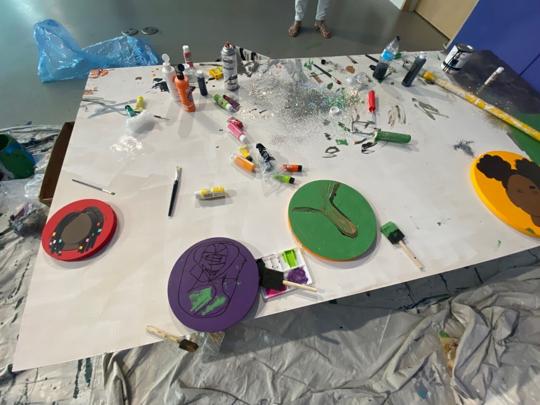Jesus warned the 12 to "beware of the leaven of the Pharisees and Sadducees" (Matthew 16:6) or "Beware of the leaven of the Pharisees, and the leaven of Herod" (Mark 8:15). Embracing the power of "and", what did He mean?
I'm told the Pharisees were huge on getting everybody involved--the Law wasn't just for priests. Teaching was pretty central, and the key was rules. In some ways they were closer to Jesus that the other groups--you can get in more fights with your family than strangers, they're nearby more often. Hedges about the law meant even more rules, but with some care there could be ways around them. A modern example: carrying keys might be forbidden work on the Sabbath, but if your key ring was on a cord attached to your belt, you weren't carrying the keys but getting dressed, which didn't violate the Sabbath rules. That sort of hairsplitting doesn't seem to express a living faith.
The Saducees managed the temple: Pay pray and obey. Religious politics seem to have been a big deal, and so was the connection with the worldly powers that had taken on themselves to appoint chief priests. They were doing quite well from temple business, and were skeptical of the prophets.
When I think of Herod I think of entertainment. And "ignore my sins." He'd enjoyed listening to John, but not repenting. Power and prestige were central. Jesus wouldn't even talk to him, though earlier He'd sort-of sent a message.
Essenes don't appear, unless John the Baptist was one. They were more like separatists, with a focus on purity and unshakeable conviction that the temple was a blasphemous farce. Since Jesus doesn't mention them at all, I suppose they weren't an issue among His disciples. So skip them.
We're pretty sure the leaven of the Pharisees was the focus on rules and models. It looks like the leaven of Herod was looking at religion as an accessory, and rejecting any rules. And the Saducees: rituals from the religious establishment are all you need.
Probably any church big enough will manage to cover all those bases in a single assembly--sometimes even alternately in a single member.
I wonder what He'd say to churches today? Maybe the 7 messages still apply. Well, maybe only 5.
Symrna and Philadelphia: tribulation is coming, be faithful. Tribulation is coming from those who think they're rendering service to God--lots of churches around the world fit that description.
Pergamum and Thyatira: have been faithful but you tolerate Nicolaitans and/or Balaamites and Jezebel who seduce people to idolatry and sexual immorality. but affirms that unlawful unions are a good thing, and places the highest happiness in pleasure, as does the man who is falsely called a Nicolaitan, this person can neither be a lover of God, nor a lover of Christ, but is a corrupter of his own flesh, and therefore void of the Holy Spirit, and a stranger to Christ. That fits some famous churches. Herod?
Ephesus: left first love, but at least you hate the Nicolaitans. I can think of a few like this. Is this usually a Pharisee-type?
Sardis: dead. Oops. I didn't think this is the demographic death type (e.g. where nobody speaks German anymore, or where all the children leave to work in the cities) but maybe it can be--not adapting to/welcoming new ethnicities. Rules and ritual are all that's left? Maybe it applies to Herod too--any of them taken to the limit.
Laodicea: nauseatingly lukewarm. Herod, taking nothing in religion seriously.
There seem to be problems in churches that don't map onto these well. Two that jump out at me are political splits (a form of idolatry?) and ethnic splits (Irish Catholic vs Mexican Catholic), and another is the abandonment of orthodox understandings about life and sex--though that one probably falls under Balaamite/Nicolaitan. Paul complains about disputes about words, of course, and that's a popular problem too. Maybe that one is the leaven of the Academy...
Some problems I assume He'd have simple and strong words for: Does believing in a pre-trib or post-trib rapture change how you worship God or treat your neighbor? No? Then make peace. Others, such as whether to use two fingers or three when making the sign of the Cross technically change how you worship God, though from outside I don't feel the importance of it.

